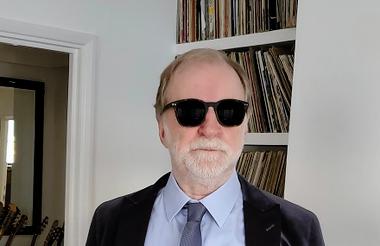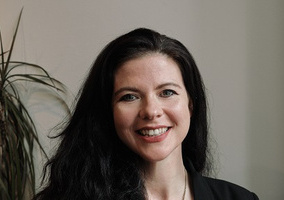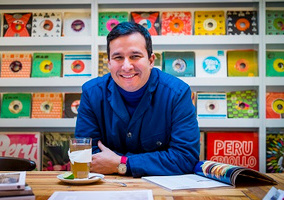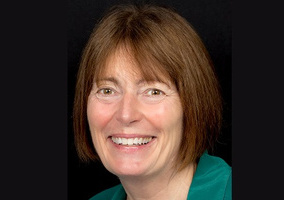Happy Friday the 13th, readers! Hopefully, you have managed to avoid any misfortune so far on this unluckiest of days.
To cheer us up, Society Diary recently sat down for chin wag with chair of disability charity Scope and music producer extraordinaire Robin Millar.
Read on as Millar shares tales of being bound to an Australian rock band’s frontman, the secrets to scoring a number one, and why musicians and charity leaders can both be difficult co-workers.
As the Original Smooth Operator, who is the smoothest operator you’ve met in civil society?
“A hard choice but I have to say Kate Nash, founder of Purple Space.
“Her own personal journey with disability; her inspirational leadership; her writing; her positivity and more than anything else, the effectiveness in bringing together so many businesses spearheading inclusivity. This is why last year Scope took on Purple Space to further enhance their impact and to draw on Kate’s knowledge, experience and smooth operator style.”
You’re no stranger to a fundraising event. What’s the hardest challenge you’ve taken on?
“I had a very clear memory of running Bob Geldof’s Race for Life in 1986, tied to the elbow of Men at Work frontman Colin Hay by his karate belt. He hadn’t told me he ran 80 miles per week for fun.
“He dragged me around London and, as all marathon veterans will know, a bell is rung at exactly the half way stage. As I stumbled past, I readily admit to begging Colin to stop and the plight of the Ethiopian refugees we were supporting almost came second to sheer exhaustion. Fortunately, Colin was more focused and we made it.”
As a producer of 44 number ones, what can charities learn from pop music about connecting with the public?
“Generally speaking, there are two factors that need to combine to make a hit.
“The first of course is a great record. The danger is that writers tend to spend time navel-gazing and their lyrics are hard to understand by people who don’t know them. The trick is to find a way of conveying the spirit or the emotion in a way that is universally easy to identify with.
“The second factor and, in my view, even more important, is the marketing. Either the artist or band need charisma, style, individuality, drive and determination or the single needs a massive event to attach to – big movies, huge sporting events, conflict. Band Aid, Everything I Do by Brian Adams, World in Union, Banks of the Ohio, A Hard Rain’s A-Gonna Fall, If You Wanna Be My Lover – all these had the lot.
“A brilliant song with an artist who won’t dress up, won’t come out of their room, won’t do interviews and who is not associated with a movement or moment stands little or no chance. Examples of where artists were good enough singers and writers to have hits and who combined this with a hugely developed sense of what it is about them others want... These are the superstars – Rolling Stones, Madonna, Sade, Beyonce, Prince.”
You’ve called for vinyl records to be banned. What old practices should charities drop in the 21st century?
“A good lesson in life is that, when the chips are down, you need to get back to your core. An example familiar to me right now is retail [Scope is in the process of closing most of its shops]. You have to think that if WH Smith need to close all their stores, being a retailer is a very heavy load and definitely a distraction for many charities.
“Our job is to change attitudes, create opportunities and try to protect vulnerable disabled people. We’ve seen from the government’s anti-social behaviour on winter fuel, national insurance and welfare cuts that we are trying to push rocks uphill.
“All charities are facing headwinds, shortage of funding due to the cost-of-living crisis and the sheer number of charities overlapping. I would recommend they all take a look around and think about cutting overheads and pooling resources to maximise their impact.
“Some of them should definitely explore a possible merger. Also, move away from the old model of trustees with wealth and good social responsibility towards those with real active lived experience knowledge and passion for the cause in question.”
What’s it like being knighted and where do you keep your medal?
“I have no idea where my CBE or my knighthood medal is. I think my wife Shelley has them somewhere safe.
“The first night after being knighted, when I got into bed my feet were waggling under the duvet like a kid who just got into the school football team. The next morning I stood in the bathroom saying: ‘Good morning, Sir Robin.’ It just seemed wrong.
“I spent time in the beginning remembering how, when I met Lord so and so or Sir so and so it was hard to shift that slightly awkward feeling of them and us. I remembered that the nice ones made a real effort very fast to get past that ‘Call me Dick’ etc. So now I think I have the balance right and say: ‘How lovely of you to recognise my title, thank you. Now, Robin is fine.’”
You’ve said you overuse the word “darling”. What do you underuse?
“It’s not a word but the thing I don’t do enough is explain. I rarely if ever explain my actions or decision. I don’t know why and there must be times when an explanation would help. I’m getting better consciously, especially as a board chairman.
“I tend to assume that people have taken on an unpaid charity role in order to assist. It often doesn’t occur to me they want recognition or thanks or support.”
Who’s more difficult to work with – musicians or charity leaders?
“I don’t find anyone difficult to work with other than people who believe they are good people when they aren’t really good enough. People are very varied in this. Some deceive themselves; others just deceive.
“So, there’s no difference between musicians or charity leaders as a genre. They are just people. There are difficult people leading bands and leading charities – the trick is to see through them. Oh and of course you can be wrong about people.”
You’ve held fundraising concerts for several big charities. Which was the hardest to organise?
“They all have a lot going on and you are usually putting artists outside their comfort zone, one way or another.
“The hardest to get together was the 2004 Voices For Darfur at the Royal Albert Hall. First, a very short deadline because unprotected people in the camps were being butchered by bandits and the UN needed urgent resourcing to put in better security.
“Organising 15 artists, from rock to musical theatre to R&B to classical opera plus the BBC 29-piece concert orchestra, in terms of rehearsing, agreeing on the arrangements and logistics was really hard work. Each artist had to sing a Cole Porter song, which was much easier for the musical theatre types than for the R&B, rock and disco divas! Even an hour before the doors opened, I wasn’t sure it would even happen. I was tired when I got home.”
You have a recording studio in Morocco. What’s the best thing about being in north Africa?
“Not being in Europe. I’ve been going to Africa for over 40 years and it’s my first love as a continent. The people more than anything else. PS and well done for describing Morocco as Africa not an Arab country – a common mistake. Berbers are one of the oldest African races of all.”
Related articles












